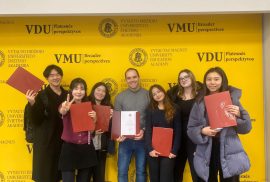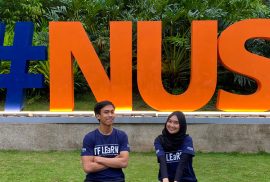Ayfa Hurin Ien, a student from English Studies Program, is currently participating in a Lithuanian Language and Culture Winter Course. This is a month-long program designed for international students to learn Lithuanian at various level while also exploring Lithuania’s cultural and historical aspects.
Arsip:
Short Courses (Summer/Winter Exchanges)
About TF-NUS LEaRN
TF-NUS LEaRN is a three-week summer program sponsored by Temasek Foundation at National University of Singapore aiming to nurture the next generation of Asian Leaders by providing opportunities for cultural exchange, networking, and leadership enhancement.


